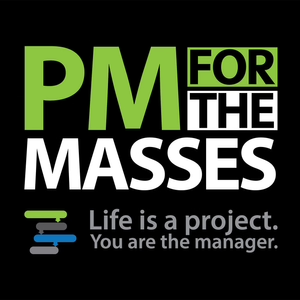
Episode 112 – The Role of the Successful Project Manager in Innovation
09/01/20 • -1 min
Previous Episode

Episode 111 – Setting the Pace – Bringing Balance into Project Management
In times of uncertainty, project managers can be the pacesetters that keep organizations on the right path and bring balance into their projects. June Mustari discusses real-life issues in project management. Hear practical tips and advice to find the right balance of discipline and flexibility for successful project delivery. Table of Contents 01:05 ... Meet June 02:36 ... Telecom Career and TruNorth Consulting 05:47 ... COVID-19 Impact and Bringing Balance 08:39 ... Emotional Engagement 10:52 ... Collaboration Tools 12:31 ... Knowing the Technical Aspects of the Industry as a PM 14:20 ... Past Project Story: Virtual Desktop Interface Migration 18:16 ... Breakthrough Moments and Resistance on the Project 21:54 ... Breaking the Rules 25:54 ... Words of Advice and Encouragement 31:22 ... Get in Touch with June 31:58 ... Closing JUNE MUSTARI: It’s all about trust. And I think more than ever trust is our cornerstone in our business. And when you can show up in a way that makes people feel secure, it’s our purpose. WENDY GROUNDS: You’re listening to Manage This, the podcast by project managers for project managers. I’m Wendy Grounds, and with me is Bill Yates. This is the show where we sometimes like to delve into the project stories of project managers who are in the trenches. In today’s episode, we get to sit down with June Mustari. Why don’t you tell us how you met June, Bill. BILL YATES: Yeah, it was such a chance meeting. June and I were sitting at the same round table at a breakout session, I think Steve Townsend was speaking, at PMI Global Conference 2019 in Philadelphia. So I don’t know, there were just a handful of us sitting at a round table, and June had really good questions for Stephen. And some of the things that June shared, I’m like, this is my kind of person. So we talked during the session and just stayed connected after. JUNE MUSTARI: Yeah. WENDY GROUNDS: Well, June, thank you so much for being here today. JUNE MUSTARI: Oh, it’s my pleasure. I’m very happy to be here. Meet June WENDY GROUNDS: I want to find out a little bit about your career background. How did you get into project management? JUNE MUSTARI: Yeah, when people ask me this, I like to say I didn’t get into project management; it got into me. I really started my career just taking things on that took shape as projects – you know, the beginning, middle, and with an end goal, an outcome that was very clear. I didn’t know what I was doing, but I was managing projects. So then when I actually started to see that there were other people in my network who were formal project managers, I was like, oh, this is a thing, and I really like this thing. And so I decided to get a little educated in it, and I said I was going to take the PMP exam 10 years before I actually took it. So people say, “I’m going to take the PMP exam.” And I said that for so long. But you don’t actually take it until you schedule it. Like, that’s when it’s real. So I did eventually get the PMP, and I appreciated the discipline of that. I’m a rule follower, so like that was a dream for me. And I passed on my 37th birthday. So it was like, I got into my car, and I was like, yes. That’s a little side note about me being a PM and getting started with that. So it just kind of took off from there. Once I had that credential, I felt confidence. I don’t think it’s about the credential. I just think it’s about the confidence. I took formal project management roles right after that, where it was like my title was Project Manager. TruNorth Consulting and Telecom BILL YATES: And June, you’ve been in telecom for a long time; right? Like I’ve done a lot of work with Verizon, and you were actually employed by Verizon for a long time, and you continue to kind of go down that industry path. JUNE MUSTARI: Yeah, my M.O. is parachuting into situations, trying to solve problems, and then getting out; right? So I had like four
Next Episode

Episode 113 – Healthcare Heroes – A Storytelling Project
Telling stories is a powerful means to teach, lead, and inspire. The best storytellers often employ their own life experiences. Sara Amiri MBA, PMP, shares her story working at Uber and Volkswagen and she explains how her passion to build unity, increase empathy, and raise awareness led to the Healthcare Heroes Project.
If you like this episode you’ll love
Episode Comments
Generate a badge
Get a badge for your website that links back to this episode
<a href="https://goodpods.com/podcasts/manage-this-the-project-management-podcast-15381/episode-112-the-role-of-the-successful-project-manager-in-innovation-11741058"> <img src="https://storage.googleapis.com/goodpods-images-bucket/badges/generic-badge-1.svg" alt="listen to episode 112 – the role of the successful project manager in innovation on goodpods" style="width: 225px" /> </a>
Copy




